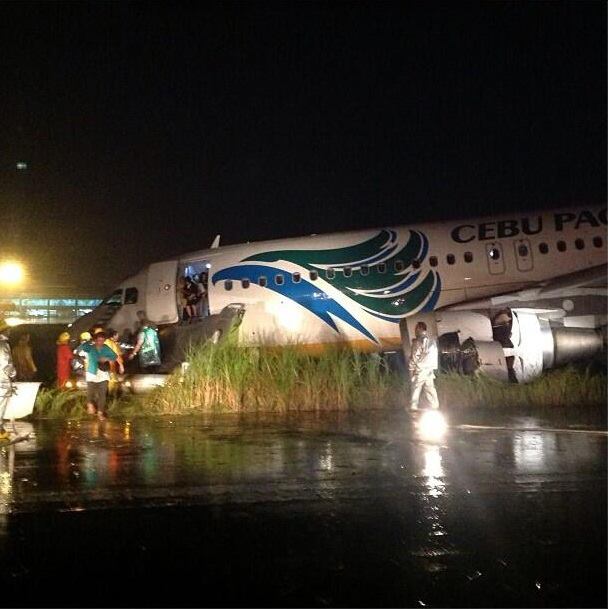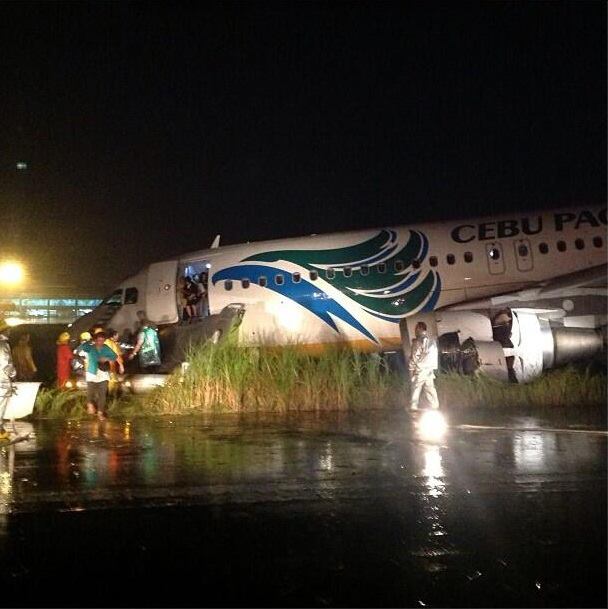By CHERRY JOY VENILES
DAVAO City–A Cebu Pacific Airbus 320 flight from Manila overshot the runway of the Davao International Airport at 7:10 p.m. on June 2, leaving all 165 passengers and crew unhurt but badly shaken.
The accident raises questions on aviation emergency preparedness, and the safety of budget air travel. The Civil Aviation Authority of the Philippines (CAAP) is awaiting the results of tests on the flight data recorder earlier sent to Singapore, but initial findings are that pilot error caused the accident.
Meanwhile, passengers on that flight made notes of what it was like to be caught in Flight 5J 971 after it nosedived into the grassy portion of the Davao airport.
1. Cebu Pacific’s flight crew remained silent as the plane bounced, and did nothing to calm panicked passengers.
Passenger Andrew Bautista said he and his wife, who occupied Seats 1E and F, knew something was wrong when the flight crew failed to issue the usual announcements—seatbelts fastened, seats upright and window shades raised. They were just told to prepare for landing.
“And then we were going so fast, that we hit the ground within ten seconds, there was a bump and then the lights went out and there was smoke all over,” Bautista remembers. And the next thing they knew, a flight attendant was crying.
Except for that, the crew was silent, and people began to panic. “The fact was that very little was said on the plane, perhaps out of fear or uncertainty,” said Nelson Lindsay, a New Zealander who was on his 40th trip to Davao.
Five foreigners were on board and begged the flight crew to speak in English for their sake but between the terrified screams, frantic ramblings, and the passengers’ rush to get their carry on baggage from the overhead bins, very few bothered to translate to any of the foreign passengers that day.
Passenger Marlon Bo took it upon himself to calm the passengers and ask them to remain seated as the plane might tilt and bring even more danger to everyone. In the darkness, people prayed and held on to their children and their family, others frantically texted friends and relatives fearing that no one would know what had happened should the plane burst in flames.
2. The pilot failed to calm the passengers’ fears, and may even have been among the first to deplane.
After more than 10 minutes on the ground, the cockpit doors opened and the captain, in a trembling voice, addressed the passengers, “Ladies and gentlemen, we are safe. Eight miles on our approach I was given the go signal to land. Five miles, I put the plane on autopilot, we landed on the right path, but due to heavy rains, zero visibility, the wiper is not working, we skidded off the runway. I’m sorry for what happened.”
Then he turned his back on the stunned passengers, the last time that any one of them would see or hear from him.

Because the PA system did not seem to be working, those at the back could barely hear what he said.
“I was the third to get out of the plane and the first thing I saw as soon as I reached the ground was a metal ladder in the pilot’s cockpit. I thought, did he leave us all here?” said Bautista who was later chosen President of the Flight 5J971 victims association.
Later, at the terminal, passengers demanded to speak with the pilots but the ground crew said the captain was still in shock.
3. The plane’s oxygen masks failed to materialize and flight crew hesitated to use the slide.
Only the emergency lights were on, as smoke filled the air, and no oxygen masks dropped from the overhead compartment.
“Sir, papaputukin ko na ba (Sir, should I pop it)?” a flight attendant asked the pilot tentatively, referring to the inflatable emergency slide in the forward exit. The Cebu Pacific Safety Instruction card, found in the airlines’ seat pockets specifically notes that all exits will be used on terrain and water landing but cautions that exits should not be opened in case of fire or obstructions.
Later, pilots through social media would note that it would take about USD 20,000 to replace, repack and recharge one emergency slide once launched.
4. Cebu Pacific ordered a defueling, even while passengers were still on board.
Dr. Jess Delgado of the Ateneo de Davao University said one of the students he was travelling with on the plane was asked to turn off her cellphone before sliding down the emergency chute, presumably because the aircraft was defueling.
“And then we realized, why are the firemen and the fire truck equipped with water and not foam? Seeing that it was a plane and the chances of an explosion was big, would water from the fire truck help us in any way?” Dr. Delgado continued.
“Aircraft fuel being highly combustible, safety precautions should be observed. For one, refueling or defueling must not be conducted with passengers on board. Two, at the first sight of lightning it should be stopped as this is extremely dangerous,” said another pilot, who asked not to be named, clarified. A thunderstorm was hitting Davao at the time of the accident.
5. No one assisted the passengers as they deplaned.
Slowly, people jumped down the forward exit slide with the men insisting that women, children and the elderly go first. And in the pouring rain, the dazed passengers realized that their agonies were not yet over. There were no shuttle buses, no emergency medical personnel or ground crew staff to greet them at the airport terminal.
Passengers eventually trooped to the baggage claim area, took baggage carts and dazedly waited for their carry on and checked-in luggage, but it would take another three hours before the baggage could be unloaded or before anyone from Cebu Pacific would be able to talk to them.
Meanwhile, a pregnant woman complained of back pains, the two older women complained of their blood pressure shooting up, and children were crying.
6. Cebu Pacific attended only to the baggage, not the people.
Only more than an hour after they disembarked did a Cebu Pacific crewmember come to tell them that their luggage would be sent to their addresses within 24 hours, but the passengers refused to leave without their bags.
A passenger named My, who was travelling with her mother, said they asked for a holding area where they could wait, because no one from Cebu Pacific had an idea how to deal with the passengers. There they were given a drink and crackers, and then told to proceed to the international arrival area where they were subjected to a security check.
“We were soaked from the rain and still in shock and we were asked to take off our shoes, bags so we could get to the holding area,” My said.
When the baggage arrived, the passengers took it upon themselves to set up a system to sort the baggage. At that point a Cebu Pacific crewmember asked them to sign a document that they have clamed all their baggage, and told them they would get P500 for a taxi ride home. The passengers however, were reminded that those travelling as families could only claim once.
At past 11 p.m., several of the passengers received a call from Cebu Pacific’s customer care unit. “They called to ask us if we got all of our baggage but they didn’t even ask us if we were okay,” says Bautista.
7. Passengers are mulling a class suit against Cebu Pacific, with help from the Davao City government.
Soon after the incident, more than 50 of the passengers banded together to form the “Flight 5J971 Victims” and sought the advise of Davao city lawyers for a possible class suit against the airline.
“There have been crashes like these before, but it has become quiet and no one has complained. It’s not just the compensation we’re fighting for, it’s the kind of service that needs to change and the kind of policies that need to be set in place,” a member of the group said.
The Davao City local government will also file a complaint against the airline as well as airport officials for the lapses allegedly committed after the runway mishap. The city government announced that it has designated help desks and a hotline for the 5J971 passengers.
Davao Mayor Sarah Duterte-Carpio, said: “We will assist them dahil attached ito sa principal complaint namin. Isang complaint nila is against sa Cebu Pacific, that is contract of carriage between the passenger and the airline, so nire-refer lang namin sila sa lawyer kung wala silang sariling lawyer.”
A careful review of the Cebu Pacific ticket sets Pasay city as exclusive jurisdiction for all cases against the airline.
